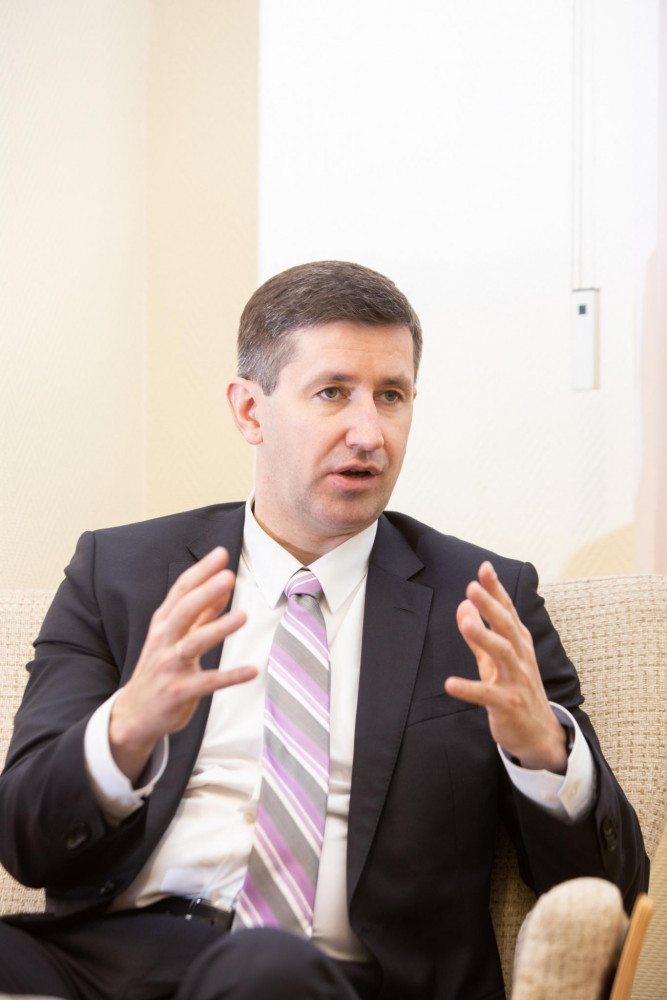MP Vjačeslavs Dombrovskis: Coalition needed more than two months to spot energy market trends

Observing trends in the energy market, the opposition in the Saeima has been calling on the government since September to apply a reduced VAT rate - from 21% to 5% - to gas and electricity for a certain period of time. The coalition has so far rejected the opposition's proposals, but as news of rising prices has become more and more vocal, it has finally reacted.
Last Friday it was announced that Latvijas gāze's natural gas tariffs for households will increase by between 54.2% and 93% from January 1, 2022, depending on the amount of consumption, according to a statement in the official gazette Latvijas Vēstnesis.
For households consuming up to 250 cubic meters of natural gas per year, the differentiated final sales tariff with VAT and excise duty will apply in 2022. For the first half of 2022, the final tariff will increase by 54.2% from 0.71472 euros per cubic meter to 1.10209 euros per cubic meter, while for households consuming between 250 and 500 cubic meters of natural gas the final tariff will increase by 66.9% from 0.57912 euros per cubic meter to 0.96649 euros per cubic meter.
For households consuming between 500 and 25,000 cubic meters of natural gas per year, the final tariff will increase by 93%, from 0.41668 euros per cubic meter to 0.80405 euros per cubic meter.
The fixed part of the natural gas payment will remain unchanged for the first half of the year, i.e. the fixed charge for the distribution service, including VAT, will remain at 3.27 euros per month for permitted loads up to 6 cubic meters per hour, and 8.99 euros per month for permitted loads between 6.1 and 10 cubic meters per hour, 14.36 euros per month for permitted loads of 10.1 to 16 cubic meters per hour, 21.91 euros per month for permitted loads of 16.1 to 25 cubic meters per hour and 32.55 euros per month for permitted loads of 25.1 to 40 cubic meters per hour.
A little later, the Ministry of Economics announced that at today's meeting of the parties forming the coalition, it would propose a temporary reduction in the VAT rate on gas. It had already announced that it had started talks with coalition partners on reducing VAT on electricity.
On the other hand, Vjačeslavs Dombrovskis, a non-factional member of the opposition, recalls that he has been calling for early preparations for the energy crisis since September. To no avail until now.
You are proposing to temporarily reduce VAT on electricity and gas. Do you think the country can afford this and how can it compensate for the lost revenue?
The country can afford it. Firstly, the government has not factored in the increase in tax revenues from higher energy prices in next year's budget at all. Nor has it factored in higher profits for Latvenergo. Consequently, according to my calculations, the application of 5% VAT on household electricity bills will cost the state budget only 9 million euros over the six-month period (until June 1). Latvenergo's profits this year alone will be approximately 28 million euros higher due to higher electricity prices. Next year's profits will certainly be much higher. Secondly, household demand for electricity and gas is very inelastic. Consequently, households will spend the savings on other goods and services. And much of the money supposedly not taken in taxes will go back into the state budget.
The coalition is also considering the same idea. Is this bill not just some kind of election campaign, an attempt by the opposition to annoy the ruling coalition?
This is our fourth attempt to get a VAT cut on electricity and natural gas! The first bill was tabled on September 30. Already back in September, we understood what was happening, what was going to happen and what the optimal solutions were. It took the coalition more than two months to understand this.
How do you explain the sharp rise in energy prices?
Several reasons. I would divide them into three groups. The first is the adverse weather conditions which have had a negative impact on many green energy sources. The second is the withdrawal of almost all European countries from long-term gas supply contracts with Russia. It was evident that Russia would not miss an opportunity to make them pay (very literally) by refusing to provide gas supplies above those contractually fixed. Thirdly, too much tilt towards green energy, not enough spare power generation capacity. Green energy has great advantages, but it also tends to be very seasonal and fickle.
This week, I convened a meeting of the Sustainable Development Committee to discuss the needs and prospects for electricity generation in the Baltic region with the Ministry of Economics and Latvenergo.
*****
Be the first to read interesting news from Latvia and the world by joining our Telegram and Signal channels.
